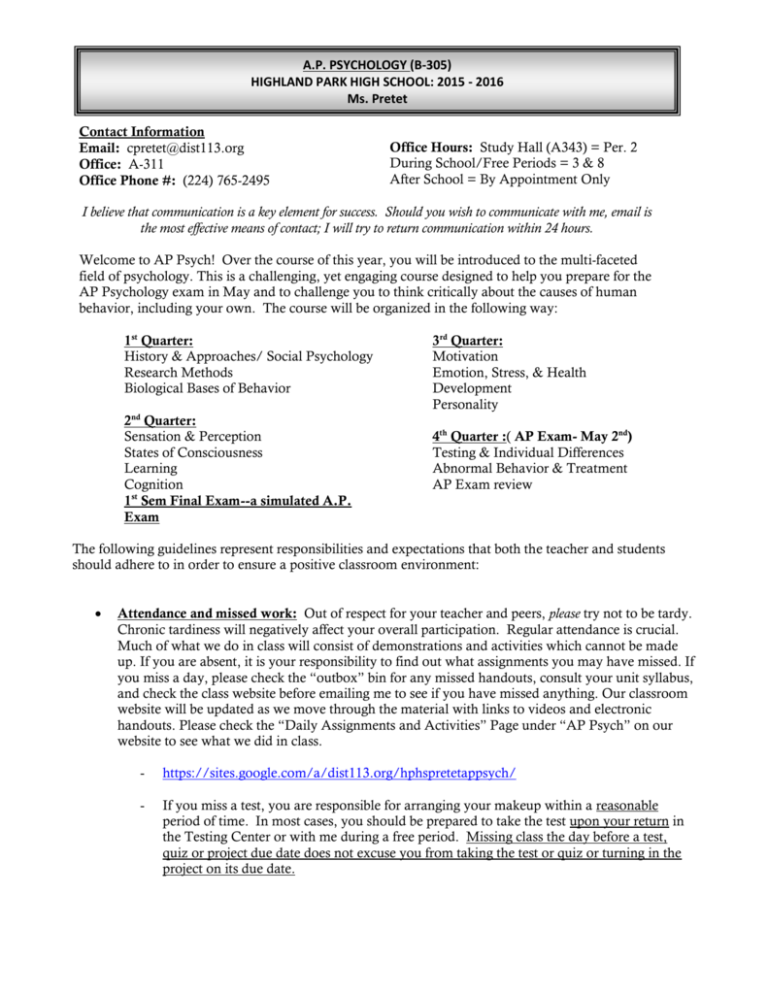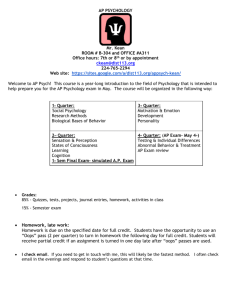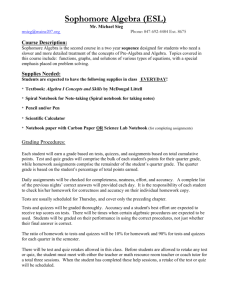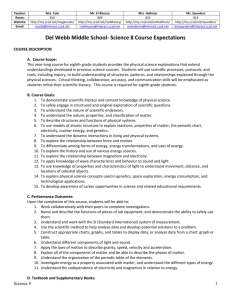AP Syllabus-policies 2015-2016
advertisement

A.P. PSYCHOLOGY (B-305) HIGHLAND PARK HIGH SCHOOL: 2015 - 2016 Ms. Pretet Contact Information Email: cpretet@dist113.org Office: A-311 Office Phone #: (224) 765-2495 Office Hours: Study Hall (A343) = Per. 2 During School/Free Periods = 3 & 8 After School = By Appointment Only I believe that communication is a key element for success. Should you wish to communicate with me, email is the most effective means of contact; I will try to return communication within 24 hours. Welcome to AP Psych! Over the course of this year, you will be introduced to the multi-faceted field of psychology. This is a challenging, yet engaging course designed to help you prepare for the AP Psychology exam in May and to challenge you to think critically about the causes of human behavior, including your own. The course will be organized in the following way: 1st Quarter: History & Approaches/ Social Psychology Research Methods Biological Bases of Behavior 2nd Quarter: Sensation & Perception States of Consciousness Learning Cognition 1st Sem Final Exam--a simulated A.P. Exam 3rd Quarter: Motivation Emotion, Stress, & Health Development Personality 4th Quarter :( AP Exam- May 2nd) Testing & Individual Differences Abnormal Behavior & Treatment AP Exam review The following guidelines represent responsibilities and expectations that both the teacher and students should adhere to in order to ensure a positive classroom environment: Attendance and missed work: Out of respect for your teacher and peers, please try not to be tardy. Chronic tardiness will negatively affect your overall participation. Regular attendance is crucial. Much of what we do in class will consist of demonstrations and activities which cannot be made up. If you are absent, it is your responsibility to find out what assignments you may have missed. If you miss a day, please check the “outbox” bin for any missed handouts, consult your unit syllabus, and check the class website before emailing me to see if you have missed anything. Our classroom website will be updated as we move through the material with links to videos and electronic handouts. Please check the “Daily Assignments and Activities” Page under “AP Psych” on our website to see what we did in class. - https://sites.google.com/a/dist113.org/hphspretetappsych/ - If you miss a test, you are responsible for arranging your makeup within a reasonable period of time. In most cases, you should be prepared to take the test upon your return in the Testing Center or with me during a free period. Missing class the day before a test, quiz or project due date does not excuse you from taking the test or quiz or turning in the project on its due date. Please note: I understand that there may be times when extenuating circumstances arise which may make it difficult for you to meet project deadlines or perform to the best of your abilities. However, if this is ever the case, I advise you to see me before class to discuss the matter. Test retakes: Tests and quizzes make up the majority of the total points we have each semester. So as not to penalize you if you have an unusually low test score on one test, I offer the opportunity to retake ONE TEST PER QUARTER. The retake must be made up within approximately one week of receiving your grade. A new test score will be calculated. Your original score will be worth 1/3 of the new test score and the retake will be worth 2/3 of the new score. Late work: Each student will be issued two “oops” passes per quarter. The purpose of an “oops” pass is to allow you two opportunities (if needed) to get full credit on an assignment which is not completed on time. The assignment must be turned in with the “oops” pass stapled to the assignment at the next class meeting in order to receive credit without penalty (you are allowed to use 2 “oops” passes for one assignment). Assignments turned in late may not receive full credit. Additionally, extra credit will not be awarded for unused oops passes. And… they DO NOT roll over. (sorry guys! ) - I will adhere to District 113 guidelines in regards to late work grading procedures. Class materials: You will need a 3 ring binder and a spiral notebook that you will bring to every class. The binder and notebook should be separate from what you use in other classes. The binder should contain unit outlines, notes, handouts, and current and past assignments. The notebook will be used as a double entry journal where you will respond to every reading. The notebook will also be used as a place to respond to “questions of the day.” I will check journals daily and periodically collect them for points on test days. ** If you are well prepared and bring the above items to class every day, textbooks may be left at home. - Book website: http://bcs.worthpublishers.com/myersap2e/default.asp#t_924621____ - On this website, you can find Web Quizzes that are similar to the test questions you will see in class. It is completely FREE! Chromebooks/Digital Devices - Overall, the digital classroom is new for teachers and students; the overriding goal of this class is to expand your learning. Where digital devices serve this purpose, all the better. Where digital devices distract from this purpose, the following policies apply: o Chrome books will be used frequently to access course information, facilitate group work, and to present information to peers in a paperless and dynamic way. o Notebook and pen are required for class every day; some class periods we will devote solely to notebook work; we will explicitly develop note-taking skills in a paper and pen medium. (Smutko and Broaders, 2013) o Students will keep digital devices closed unless explicitly required for class. Students are still subject to the rules of the student handbook regarding cell phones and other devices o Students caught using off-task websites may lose the privilege of using Chromebooks for the day, and for, repeat offenses indefinitely. Learning Targets: Student learning targets are shared through rubrics, evaluation criteria, and examples. Much of our work focuses on building analytical reasoning skills through formative assessments that emphasize the exploration and application of psychological concepts. In-class and out of class assignments are designed to provide opportunities to practice skills and develop competency to succeed on summative assessments, including the Advanced Placement Exam. Grading: Grades will be assessed cumulatively according to a point system in which all assignments, papers, quizzes/tests, group activities, community involvement, and projects will be assigned a point value and combined to make up 85% of your total semester grade. Grading will be cumulative through each semester. You should expect to take a final exam first semester worth 15% of the total semester grade. Therefore, the quarter grade serves as a progress report that shows the student’s current standing halfway through the semester. On occasion we will have pop reading quizzes to help you gauge and demonstrate your level of your comprehension before the major unit tests. PERCENTAGES CALCULATE AS FOLLOWS: I round grades at .5 or above at SEMESTER only. 93-100 A 90-92 A87-89 B+ 83-86 B 80-82 B77-79 C+ 73-76 C 70-72 C67-69 D+ 63-66 D 60-62 D59 & below E Please note: academic honesty is a top priority. Cheating in any form will not be tolerated and could result in a zero for the assignment. Please read these policies carefully and keep them in your binder. If you have any questions or concerns please feel free to contact me. I am looking forward to our class this year and working together to make this a positive experience for all. - Ms. Pretet







